- Home
- Janice Kay Johnson - His Best Friend's Baby
Brace For Impact Page 3
Brace For Impact Read online
Page 3
She never did find Marshal Rankin’s bag, but did finally locate most of the tail section of the plane. Packed in a compartment that hadn’t broken open were two blankets, a pair of parkas, hats and gloves, a plastic jug full of water and a tool kit. Best of all was the cache of energy bars. They might have been in here forever, might be stale, but she wouldn’t care.
Anxiety continuing to mount with her consciousness of time passing, she stuffed what she thought would be most useful into the duffel bag, finally discarding more clothes in favor of a puffy, too-large parka and the gallon of water. The shovel that unfolded...she couldn’t think what she’d use it for, short of digging graves.
At last, she used one of the shirts to make a crude sling for her left arm, then slung the duffel as comfortably as she could—which wasn’t comfortable at all—over her right shoulder.
Straightening, she looked around. She couldn’t actually see enough through the trees to orient herself at all. Downhill would surely be easiest. She’d be bound to find a stream eventually. All that snow she’d seen from above must be melting, and the water had to go somewhere.
The flaw was that anyone in pursuit would assume she’d choose the easiest route. Which meant...she couldn’t.
She’d go up.
* * *
HER ONLY CONSOLATION was that she lost sight of any evidence of the plane crash within minutes. Immediately, she began to second-guess herself. Maybe she would have been better off heading toward a lower elevation where the forest grew thicker, the trees taller. How would anyone find her there? She could huddle beneath some undergrowth until...
I die?
Her mind veered away from the bleak thought. She was panting as if she was at the end of an hour-long spin class, and she doubted she’d been on her way ten minutes. Although it might have been longer, or only five minutes. Time blurred. Each foot up ward that she managed to haul herself required an enormous effort. She grasped rocks or spindly tree trunks and heaved herself up. A few times she turned to look back, but all she saw were trees and land that plunged sharply up and down. Weren’t there supposed to be meadows in the mountains? Lakes?
The duffel bag grew heavier and heavier. Once she permitted herself to stop and take a few sips from the plastic jug and, despite a complete lack of appetite, eat half of an energy bar, hoping it would provide fuel to overcome her increasing lassitude. Her legs wobbled when she pushed herself to her feet again, but she scrambled upward over a rocky outcrop. Even with boot soles that had a deep tread, her feet kept slipping. If she wasn’t on rock, roots tripped her. A few times she found herself crossing bands of snow. She felt too exposed in the open, but too tired to make herself go around.
Nothing in her head felt like an actual thought. She would stare at her feet until one of them moved. At her hand until it found a grip. Her world became the next step, and the pain that tore at her body.
Stop. Have to stop.
Another step.
She hardly noticed when her legs crumpled, when she crawled to the closest thing she could call shelter: a fir twisted by some natural calamity so that it grew nearly sidelong to the ground. Maddy squirmed until she felt almost hidden, and then she curled up, shaking.
* * *
WILL CONTINUED TO scramble along among the clusters of the highest, cold-stunted firs. He continuously scanned the trees downslope for any sign of recent scarring. He didn’t have to pull out his GPS or compass; he could see over to a facing ridge, beyond which he knew was the deep drop-off into the Torrent Creek gorge. Ahead, water flung itself in a long series of waterfalls. Somewhere in his pack he had a map that would probably tell him what that stream was called.
He did pause now and again to check his watch, dismayed to see that several hours had already passed, and to use his binoculars to scan in a semicircle.
It was through the binoculars that he saw something off. An animal, maybe, but he didn’t think so. The branches of a particularly oddly shaped alpine fir shook. There seemed to be a black lump, and a splotch of red. Part of the plane?
He altered his path with a specific goal now. The descent was damned steep, in places close to a class-three pitch. If he fell...no, he wouldn’t even consider the possibility.
The closer he came, the less convinced he was that he’d seen a piece of metal. Somebody might have stowed a pack there with the intention of coming back for it—although this wasn’t anyplace logical for a climber to pass through.
He was close when his feet skidded and he slid ten feet on his ass, swearing the entire way even as he employed his ice ax to slow the plunge enough to keep him from colliding with the boulder that lay ahead.
The tree shook. He regained his footing close enough to it to see that a woman huddled beneath the skimpy branches...and that she held a big black handgun in trembling hands. Aimed at him.
Will didn’t move, barely breathed as he eyed the black hole down the barrel. “Would you mind pointing that away from me?” he asked.
It wasn’t just her hands or the tree branches that shook. It was her whole body. He saw blood, a lot of it, and that she held the gun strangely, the butt almost against her sternum and resting on her other hand—which extended from flowery fabric wrapped around it. Brown hair formed a shrub around her face, poking out in places, matted with blood in others. Her face was a pasty white where it wasn’t bloody. He wasn’t close enough to see her eyes.
“You’re hurt.” He did his best to sound calm, even gentle. “Will you let me help?”
“I’ll shoot you.”
The words weren’t really clear. He frowned, realizing her teeth were chattering like castanets. He knew shock when he saw it. Will felt something like exhilaration, because she almost had to be from the downed plane. A survivor, by damn. Although why hadn’t she stayed with the wreckage?
“Please don’t,” he said quietly. “I don’t mean you any harm. I was on the summit of Elephant Butte—” he nodded toward the mountain, not sure gesturing with his hands was a good idea right now “—and I saw a small plane crash. I thought I might be able to help.”
She studied him, shaking and wild-eyed. “I won’t—” chatter “—let you kill me.”
Stunned, Will stared at her. “Why would you think—” And then, damn, he got it. “You think the crash wasn’t an accident,” he said slowly.
“I know it wasn’t.” The barrel of the gun had been sagging, but now she hoisted it again. “I knew somebody would come looking for me.”
“That somebody isn’t me. I’m a medic. I’m here in case somebody was injured.” Will hesitated. “Can I set my pack down?”
After a discernible pause, she said in a gruff voice, “Okay.”
He kept his movements slow. Lowered the pack to the hillside, laid the ice ax beside it and then squatted to make himself less alarming. He was a big guy, tall and broad enough to scare any woman alone in an alley—or on the side of a mountain. The two days of dark scruff on his jaw probably didn’t help, either, or the fact that his face wasn’t pretty at the best of times.
“Will you tell me what happened? Why you’re scared?”
“Who—” mumble “—you?”
“Me? Ah, my name is Will Gannon. I got out of the military ten months ago, after getting hurt pretty bad.” He hesitated. “I was shot, so you’ll excuse me if I don’t love seeing that gun pointing at me.”
She looked down as if forgetting she held it. He hadn’t forgotten for a second, given the way she was trembling. He hoped the trigger wasn’t extra sensitive.
“Oh.” She lowered the gun so it lay on her thigh, pointing off toward the southwest. “Sorry.”
“Thank you.” What could he say that would reassure her? “You’re worrying me. I think you’re in shock, and I can tell you’ve been hurt. I have some first-aid supplies in my pack, and I was a medic in the army.”
“You promise?”
/>
“Cross my heart.” He cleared his throat, recalling the follow-up: and hope to die. Maybe not the best choice of words.
But she nodded. “Okay.”
He took the chance to rise to his feet, pick up his pack and cautiously approach her. This time when he squatted, he was able to tip her face up and to the side so he could see an ugly gash running into her hair.
“Headache?”
“Yes.”
Worse, her hazel eyes were glassy. On the good news front, she was conscious and coherent.
“You mind?” he said, closing his hand around the gun and easing it away from her. A Glock, which meant no safety. Not reassuring given that he’d have to carry it somewhere as he scrambled and fell down into the valley.
That worry could wait.
He kept talking to her as he unzipped the compartment on the outside of the pack that held what medical supplies he carried. First, he pulled out a package of sterile wipes. Once again gripping her chin, he cleaned her face, going through several of the wipes. Antibiotic ointment, gauze pad, tape. Then he asked, “Any other blows to your head?”
“Don’t know.”
He nodded and carefully explored, sliding his fingers beneath her hair and finding a couple of lumps. He’d have been surprised if there weren’t any. Then he dug out a wool knit beanie with a fleece lining, and tugged it onto her head. The afternoon still felt warm to him, but she was shaking partly from cold.
“Were you the pilot?” he asked.
For a minute he thought she hadn’t heard him, or was just shutting down. But then she said, “No.”
“Was he killed?”
“Both dead. I was in the backseat.”
“You’re sure they’re dead?”
A shudder rattled her. Her head bobbed, just a little.
“All right,” he said calmly, “I need to look at your other injuries. Let’s wrap something warm around you so you don’t get chilled.”
While a terrified woman was stripping, he meant. Yep, either that, or he’d be peeling off her clothes.
Chapter Three
Maddy couldn’t look away from this stranger she had to trust. As out of it as she’d been, she wouldn’t have been able to hold him off for two minutes.
A scar that started at one jutting cheekbone and ran over his temple marred Will Gannon’s long, bony face. He had dark hair, shaggy enough to curl around his neck, and he was either growing a beard or just hadn’t shaved for a few days. His eyes were light, though; gray or gray blue. Crow’s-feet beside them made her wonder how old he was or whether he’d squinted into an awful lot of sunlight. He was tall—really tall, she thought—with the long muscles of a basketball player instead of the bulky, weight lifter kind.
As if his appearance or age mattered. But better to think about him than her situation.
He wanted to inspect all the places where she hurt. Since she hurt all over, was she supposed to take her clothes off?
“Do you...” She cleared her throat. “Do you have some aspirin or something?”
A smile did astonishing things to a face that had scared her at first sight. “I do. But I want to be sure I know about your injuries before I give you anything.”
“Oh.” If only she wasn’t so fuzzy. And cold. “I’m not sure. My shoulder or arm or something. And—” she flapped her good hand toward her torso “—kind of everywhere. Maybe my knee.”
“All right. Can I look in your bag?”
She stared at him, puzzled. Without waiting for permission, he unzipped her duffel, sorted through the contents and pulled out a blanket he partly wrapped around her, his enormous hands careful. Then he untied the shirt she’d been using as a sling, and studied her T-shirt.
“You attached to this?”
“What?” She glanced down. “No.” Too bad if she had been. It made her shudder to imagine dipping it in a sink filled with cold water. The blood would tint the water red, not just pink.
When she looked up, she saw the knife that had appeared in his hand and shrank back.
“Hey.” He waited until her eyes met his. “I need to cut the shirt off you so we don’t have to lift your arms. I swear I won’t hurt you.”
Her teeth chattered a few times before she could get her jaws clamped together, but she nodded and closed her eyes, clutching one edge of the blanket. If he’d meant to kill her, she’d be dead already.
A minute later he said, “Damn.”
Her eyes flew open. “Damn?”
“The humerus is broken. Upper arm,” he said absently. Fingertips slid along her collarbone, pausing at a sizeable bump she could see when she craned her neck. “Pretty sure the clavicle is, too.” He sank back on his heels, obviously thinking. “Let’s pack your arm with snow for a little bit before I put a splint on.”
He had a splint? Did mountain climbers usually carry things like that, or did he because of his medic training?
He had her lift her right arm, nodded in satisfaction, and explored her rib cage, which even she could see was bruised, and suggested that her ribs might be cracked. “I’ll bind them,” he told her. “That should make you more comfortable.”
A shot of morphine might make her more comfortable. Too bad she doubted he could produce anything like that from his pack.
Instead, he came up with two plastic bags, filled them with snow, wrapped each with what appeared to be one of his T-shirts and had her lie down. Then he placed one snow pack on her upper arm and had her hold it. The other he laid across her rib cage.
“I know you’re freezing,” he said apologetically. “These will help if you can hold out for a few minutes.”
She gave a jerky nod.
He got busy untying her boots, pulling them off and easing her jeans down her legs, too.
She ought to feel self-conscious or unnerved, but she didn’t. It was more as if she was standing behind an observation window, watching.
A big purple bruise showed on her kneecap, but the knee still bent fine and without significant pain. “I fell on my knees a few times,” she offered.
One corner of his mouth turned up. “That’d do it. I think it’s okay.”
That was when she remembered she had a first-aid kit, too. When she told him, he found it in her duffel bag, opened it, grunted and closed it again.
“Nothing really helpful right now.” He laid a hand on her calf. “You’re cold.”
Teeth clenched, she nodded. The heat of his big hand felt so good. She was really sorry when he removed it so he could explore the contents of her duffel more thoroughly. He pulled out the pajama bottoms and clean jeans, then gently dressed her in the two layers. Appearing unsatisfied with the couple of shirts she’d brought, he dug around in his own pack and pulled out a green flannel shirt. It might be way oversize on her, but the fuzzy flannel felt really good when he tugged it on her good side.
Kneeling beside her, he moved the ice on her arm once, finally deciding it was as good as it would get. The splint just looked like a roll of foam to her, but he adjusted it and closed the Velcro fastenings. He frowned when he sat back.
“I should splint your entire arm, but unless you’re airlifted, we have to walk out of here. Plus, I don’t want the weight of your arm hanging, given the break in the clavicle.”
He used the knife on the flower shirt, making a simpler sling that went over the borrowed flannel shirt. Then he rolled the sleeves up half a dozen times, helped her sit up and gave her ibuprofen with water followed by a handful of almonds.
After he tucked the blanket back around her, Maddy saw his expression change, become flat, even hard.
“All right,” he said. “You need to tell me what’s going on. Why you’re scared. And where the wreckage is.”
Her fear blasted through that observation glass and was no longer nicely kept at a distance.
She gra
bbed his arm. “You can’t use the radio or the beacon. If you won’t promise, I won’t tell you where it is.”
His eyebrows rose at her challenge. “I found you. I can find it.”
Oh, dear God, she thought suddenly. “Have you already called and told anyone what happened?”
His eyes narrowed. They were gray, she’d already decided, clear and occasionally icy. “No,” he said after a minute. “No coverage.”
Maddy sagged. “A bomb brought the plane down. That’s what...” She broke off, trying to think. How much did she have to tell him? Should she still be Cassie or give him her real name? What if he didn’t believe a word she said? Not that he was the enemy; he’d been too kind, too gentle and too thorough with her. Still, he might talk to the wrong person. If she started lying now, would he know? Would he be willing to help her get out of this wilderness, just him?
He wouldn’t if she lied, that was for sure.
So she took a deep breath, which hurt, of course, and said, “One of the men with me was a US marshal. He was alive when I found him. He said it had to be a bomb, and that meant he’d been betrayed by someone in his office. Not to trust anyone there. He said somebody would show up to be sure I was dead. And that I should run.” Unable to read what this hard-faced stranger was thinking, she finished. “So I did.”
And then she held her breath, waiting for him to insist the head injury had made her delusional.
* * *
WILL DIDN’T LIKE a single thing she’d said. If she hadn’t been so obviously scared out of her skull, he’d have discounted a story so unlikely. Sure, he was climbing in the backcountry of the North Cascades when a bomb took down a plane carrying a now-dead United States marshal and a woman fleeing...who? What?

 Home Deadly Home
Home Deadly Home From Father to Son
From Father to Son All the Lost Little Horses (A Desperation Creek Novel Book 2)
All the Lost Little Horses (A Desperation Creek Novel Book 2) Hide the Child
Hide the Child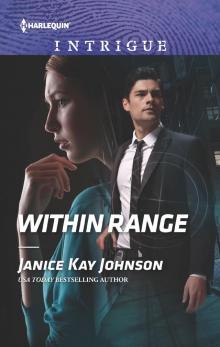 Within Range
Within Range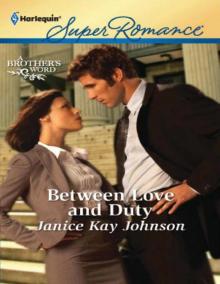 Between Love and Duty
Between Love and Duty First Comes Baby
First Comes Baby Charlotte's Homecoming
Charlotte's Homecoming In A Heartbeat (HQR Superromance)
In A Heartbeat (HQR Superromance)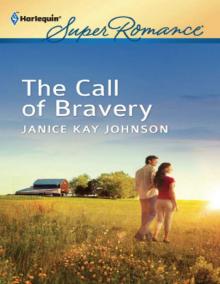 The Call of Bravery
The Call of Bravery In Hope's Shadow
In Hope's Shadow Anything for Her
Anything for Her Harlequin Superromance September 2014 - Bundle 1 of 2: This Good ManPromises Under the Peach TreeHusband by Choice
Harlequin Superromance September 2014 - Bundle 1 of 2: This Good ManPromises Under the Peach TreeHusband by Choice The Baby Agenda
The Baby Agenda More Than Neighbors
More Than Neighbors Her Amish Protectors
Her Amish Protectors All That Remains
All That Remains Whisper of Revenge (A Cape Trouble Novel Book 4)
Whisper of Revenge (A Cape Trouble Novel Book 4)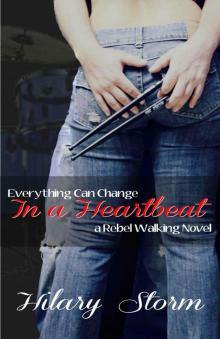 In a Heartbeat
In a Heartbeat A Mother's Claim
A Mother's Claim Because of a Girl
Because of a Girl Back Against the Wall
Back Against the Wall Dangerous Waters
Dangerous Waters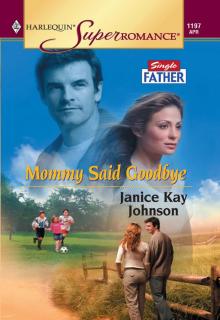 Mommy Said Goodbye
Mommy Said Goodbye A Mother's Secret
A Mother's Secret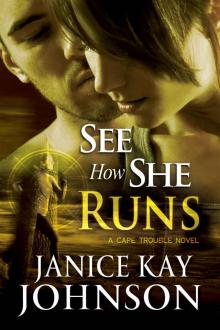 See How She Runs (A Cape Trouble Novel Book 2)
See How She Runs (A Cape Trouble Novel Book 2) Plain Refuge
Plain Refuge Bringing Maddie Home
Bringing Maddie Home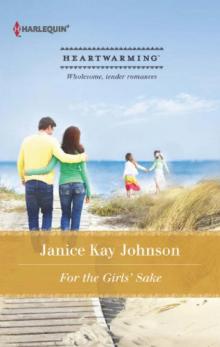 For the Girls' Sake
For the Girls' Sake Through the Sheriff's Eyes
Through the Sheriff's Eyes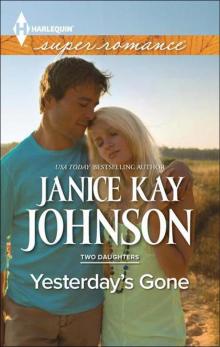 Yesterday's Gone (Two Daughters Book 1)
Yesterday's Gone (Two Daughters Book 1) All a Man Is
All a Man Is Harlequin Superromance January 2014 - Bundle 1 of 2: Everywhere She GoesA Promise for the BabyThat Summer at the Shore
Harlequin Superromance January 2014 - Bundle 1 of 2: Everywhere She GoesA Promise for the BabyThat Summer at the Shore No Matter What
No Matter What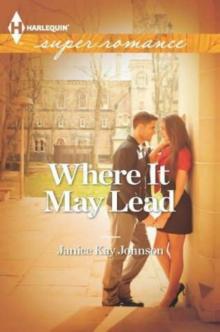 Wakefield College 01 - Where It May Lead
Wakefield College 01 - Where It May Lead Someone Like Her
Someone Like Her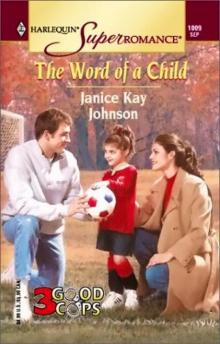 THE WORD OF A CHILD
THE WORD OF A CHILD Harlequin Superromance May 2016 Box Set
Harlequin Superromance May 2016 Box Set Open Secret
Open Secret The New Man
The New Man Finding Her Dad
Finding Her Dad The Perfect Mom
The Perfect Mom All Through The House
All Through The House Match Made in Court
Match Made in Court Making Her Way Home
Making Her Way Home From This Day On
From This Day On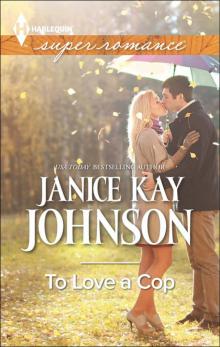 To Love a Cop
To Love a Cop The Hero's Redemption
The Hero's Redemption HIS PARTNER'S WIFE
HIS PARTNER'S WIFE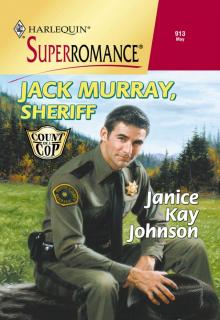 Jack Murray, Sheriff
Jack Murray, Sheriff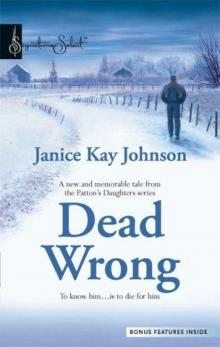 Dead Wrong
Dead Wrong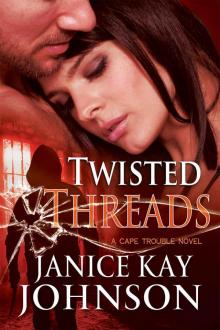 Twisted Threads (A Cape Trouble Novel Book 3)
Twisted Threads (A Cape Trouble Novel Book 3)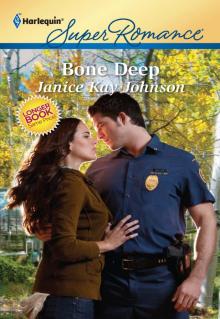 Bone Deep
Bone Deep The Closer He Gets
The Closer He Gets With Child
With Child Whose Baby?
Whose Baby? Kids by Christmas
Kids by Christmas